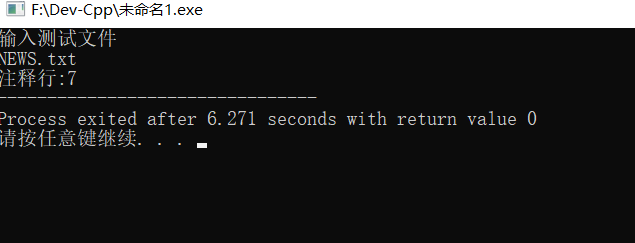WordCount扩展与优化
合作者:201631062327,201631062128
码云地址:https://gitee.com/LIUJIA6/WordCount3
一:项目说明
本次项目是在上次作业WorldCount的基础上,利用结对编程的思想,完成对WorldCount项目的功能扩展
-s 递归处理目录下符合条件的文件。(实现)
-a 返回更复杂的数据(代码行 / 空行 / 注释行)。(实现)
空行:本行全部是空格或格式控制字符,如果包括代码,则只有不超过一个可显示的字符,例如“{”。
其中,代码行:本行包括多于一个字符的代码。
空 行:本行全部是空格或格式控制字符,如果包括代码,则只有不超过一个可显示的字符,例如“{”。
注释行:本行不是代码行,并且本行包括注释。一个有趣的例子是有些程序员会在单字符后面加注释。[file_name]: 文件或目录名,可以处理一般通配符。
二:部分代码
基础功能:测试返回单词数,字符数,行数
int countw(char *file)//返回文件词的数目 { FILE *f; f=fopen(file,"r"); char ch; if(NULL==(f=fopen(file,"r"))) { printf("文件"); } else while(!feof(f)) { ch=fgetc(f); if((ch >= 'a'&&ch <= 'z')||(ch>='A'&&ch<='Z')||ch=='_') aword=1; else if (aword) { cword++; aword=0; } } fclose(f); printf("单词数:%d ",cword); } int countc(char *file) //返回文件的字符数 { FILE *f; f = fopen(file, "r"); char a; if(NULL==(f=fopen(file,"r"))) { printf("file is NULL"); } else while (!feof(f)) { a=fgetc(f); if (a != ' '&&a != '\n'&&a != '\t') cchar++; } fclose(f);printf("字符数:%d ",cchar); } int countl(char *file) //返回文件的行数 { FILE *f; f = fopen(file, "r"); int cline = 0; char a; if(NULL==(f=fopen(file,"r"))) {printf("file is NULL");} else while(!feof(f)) { a=fgetc(f); if(a=='\n'||a=='\t') cline++; } fclose(f);printf("行数:%d ",cline); return 1; }
拓展功能:测试返回代码行,注释行,空行和txt文件数
int count_blankline(char *file) //返回文件的空行数 { FILE *f; int b_num = 0; int ch_num = 0; char ch; f = fopen(file, "r"); if(NULL==(f=fopen(file,"r"))) { printf("file is NULL"); } else while (!feof(f)) { ch= fgetc(f); if (ch=='\n'){ if (ch_num<= 1) b_num++; ch_num = 0; } else if (ch!=' '&&ch!='\t'&&ch!='}') ch_num++; else if(ch=='}')b_num++; } fclose(f);printf("空行数:%d ",b_num); } int count_noteline(char *file) //返回文件的注释行数 { FILE *f; int ch_num = 0;int note_num=0; char ch; f=fopen(file, "r"); if(NULL==(f=fopen(file,"r"))) { printf("文件不存在"); } else while (!feof(f)) { ch= fgetc(f); if(ch=='\n'){if(ch_num==2) note_num++; ch_num=0;} else if(ch=='/') ch_num++; else if(ch_num==1){if(ch=='/') ch_num++;} } fclose(f); printf("注释行:%d ",note_num); } int count_codeline(char *file)//返回文件的代码行数 { int ch_num = 0; int code_num=0; FILE *f; int tag=0; int flag=0; char a; f = fopen(file, "r"); if(NULL==(f=fopen(file,"r"))) {printf("文件不存在");} else while (!feof(f)) { a=fgetc(f); if(flag==2) { flag=0;tag++;} else{ if(a=='\n'&&ch_num>1) {code_num++; ch_num=0; } else if(a != ' '&&a != '\n'&&a != '\t'&&a!='/') { ch_num++;} else if(a=='/'){ flag++;} } } fclose(f); printf("代码行数:%d ",code_num-tag); } int searchfile(void) //寻找文件夹中的txt文件 { struct _finddata_t filefind; long handle; int t=0; if( (handle=_findfirst( "d:\\wordcount\\*txt", &filefind)) == -1L ) { printf( "没找到txt文件\n"); } else do{ t++; printf("找到文件:%s\n", filefind.name); }while (_findnext(handle,&filefind)==0); _findclose(handle); printf("txt文件数量:%d\n",t); return 0; }
三:单元测试
由于本次项目采用传统的C语言,就没有很好的工具可供使用。于是我们就手写了部分功能的单元测试(单元测试大同小异,选了几个单元进行测试)。
首先是字符数统计的测试
int countc(char *file); int main () { FILE *fpt; char filename[30]; printf("输入测试文件\n"); scanf("%s",&filename) ; fpt=fopen(filename, "rb"); countc(filename); return 0; }
输入正确的txt文件名,输出结果如下

然后是注释行统计的测试
int count_noteline(char *file); int main () { FILE *fpt; char filename[30]; printf("输入测试文件\n"); scanf("%s",&filename) ; fpt=fopen(filename, "rb"); count_noteline(filename); return 0; }
同样,测试结果如下

四:总结
通过这次的结队编程合作,了解到了在团队合作时应该具备的基本素质,需要和队友及时沟通,完成代码的结合配对。同时本次过程中对WordCount的功能有了更加全面的了解与掌握,也对单元测试有了更深的了解。


 浙公网安备 33010602011771号
浙公网安备 33010602011771号